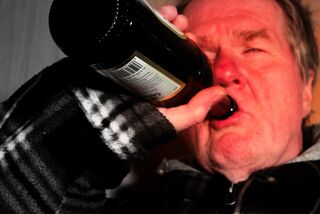Addiction
A Different Way to Think About Addiction
A definition that explains all addictions and the problem behind them.
Posted March 7, 2021 Reviewed by Abigail Fagan

The word “addiction” gets used a lot in our lives. There is the more precise clinical use of the term, which speaks about “uncontrolled use of a substance despite harmful consequences.” Another definition, still more narrow, says that you’re addicted to anything if you have physical withdrawal symptoms when you stop taking it. There is the more generic use of the term as in “I’m addicted to chocolate” (or ice cream, or coffee, or pick your perceived vice). We speak about having an addictive personality. Sometimes it can seem as if everyone is addicted to something, and if you think you’re not, you’re in denial.
At the risk of further muddying these already murky waters, I want to offer my own definition, which I have found helpful in conceptualizing a wide variety of behaviors: Addiction is reaching for something outside yourself that has to come from within.
What do I mean by this? Let’s start with the more common examples: I use wine to de-stress from a long day with a job and kids. I start with one glass occasionally, and over time it becomes a bottle a night. I am depending on the wine to help me relax, when I really need to learn to relax on my own, such as through meditation, or a hot tub, or yoga.
Another example: I like to have a piece of chocolate when I’m feeling blue. Over time, this becomes a bar of chocolate each time I get upset. Or I start to use food to manage my moods, what is called “emotional eating.” Again, I’m using something outside myself — chocolate, or other food — to regulate what I need to regulate from within (my moods). Rather than exercising, or journaling, or speaking to a friend, I start to rely on an outside substance (some type of food) to regulate how I feel.
The problem with relying on something outside ourselves for something that ultimately has to come from within is that we are reinforcing a pernicious lie, telling ourselves in effect “I can’t handle this on my own.” Feelings become threatening. This lie, over time, eats away at our sense of self and self-sufficiency, making us feel weaker inside and like we need more and more from the outside. It sets in motion the addictive cycle, where the more you use whatever it is you use to soothe yourself, the less you feel you can do it on your own, the more you need to use to soothe that sense of basic inadequacy. The first uncomfortable feeling we have we begin to look for a way to make that feeling go away. The snowball effect of this can manifest in all the ways we’re familiar with: obesity, substance addiction, etc.
Of course not every person who drinks wine at the end of a day is an addict, nor are people who keep a stash of chocolate in the cupboard. But I think all of us can benefit from asking ourselves just what is that yucky feeling we’re having and is there some other way to deal with it than reaching for a beer, or our phone to play a game with, or flipping on the TV? We are all capable of feeling our feelings, and letting ourselves do so without distraction helps us grow into the full adult versions of ourselves we were born to become.


